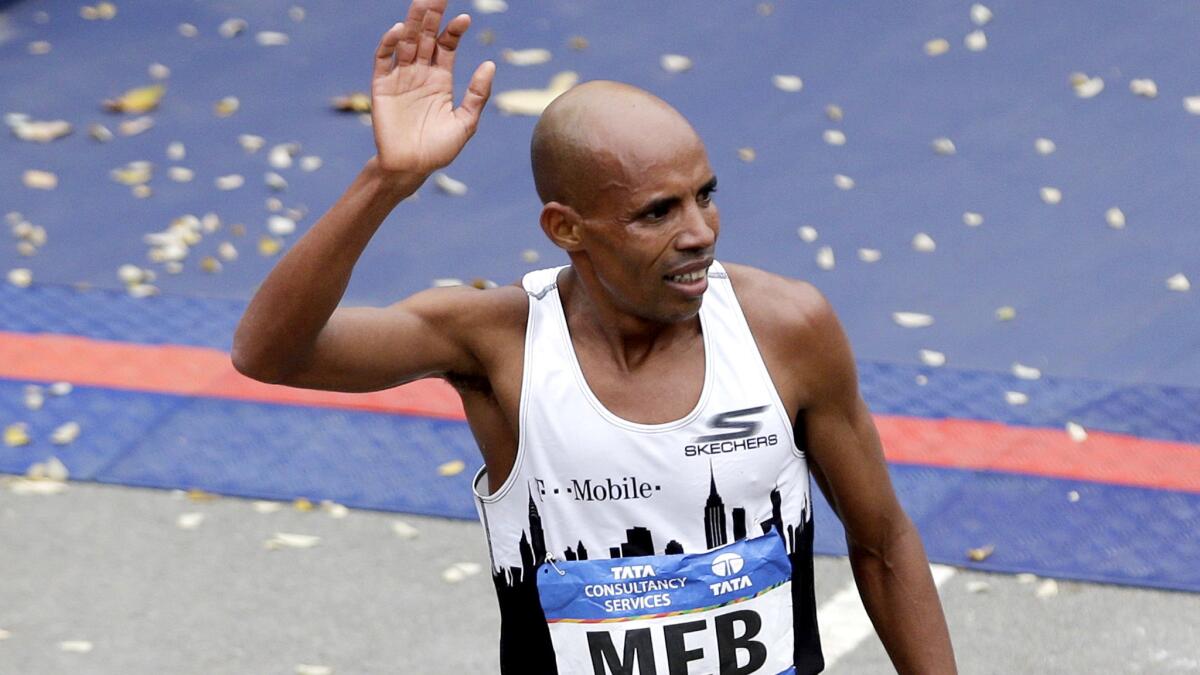Marathon trials notes: Turns could be the turning point

Meb Keflezighi acknowledges fans after he crosses the finish line at the New York City Marathon in November.
- Share via
Because no one knows what the Olympic marathon course will look like in Rio de Janeiro, it’s impossible to say if the U.S. Olympic trials course in Los Angeles — which consists of a 2.2-mile loop and a six-mile loop run four times — will be torture or great preparation for the Summer Games. Warm weather will also be a factor Saturday as runners vie for Team USA’s three men’s berths and three women’s berths.
“There’s no question that a lot of turns both breaks your momentum and beats your legs up,” said Craig Masback, a former elite middle-distance runner and now an NBC Sports analyst. “There wasn’t a lot of talk about this before London, but there was a lot of talk afterward that the many turns on the London course definitely took its toll on people.”
Women’s favorite Shalane Flanagan said she tried to study the turns Friday but couldn’t because the course wasn’t set up. “The only real significant one is at the start/finish area, the U-turn, I think,” she said. “I don’t know how tight of a turn it’s going to be—if it’s going to be hairpin or if it’s going to be a wide bank, like a track kind of turn. I think that will probably be the most technical aspect and the most tiring for most athletes.
“I feel for every single person who’s going to have to make it the last time, the last turn. I think people are going to wish that wasn’t there. But I think the rest of the course is going to be fun. It’s going to switch up the muscles for the athletes. If you overuse one type of muscle it can just lead to a lot of fatigue, but I think with all the turns it will keep people awake. I think for me, it excites me. It reminds me of some cross-country in there.”
Masback’s picks in the women’s field are Flanagan, Desiree Linden and either Kara Goucher or Amy Cragg. “Goucher seems to be pulling things together at just the right time,” Masback said. But he believes Cragg will be inspired by her fourth-place finish in the 2012 trials and decision to move from Providence, R.I., to Portland, Ore., to train with Flanagan. “I think those kinds of dramatic, uproot yourself, make a life change, do all that, those are tremendously motivating factors when you get into a race,” he said.
Among the men, he singled out Meb Keflezighi. “He always seems to deliver a big race when it matters and when it counts,” Masback said. Masback also sees first-time marathoner Galen Rupp as a wild card. “You just never know what happens in the marathon past that 20-mile mark,” he said. “There’s no question that he can run that distance comfortably, but what happens over the last six miles is very individual and very circumstantial to the particular race and day.”
Etc.
Prize money of $600,000 will be split among the top 10 finishers in the men’s and women’s fields. Each winner will get $80,000….
The average age of the trials entrants is 30.5 for the women and 28 for the men. The oldest were Colleen De Reuck, 51, and Kevin Castille, 43. The youngest were Alana Hadley, 19, and Arya Banreini, 22….
The Los Angeles Master Chorale will sing the national anthem before the start of Saturday’s races.
Twitter: @helenenothelen
More to Read
Go beyond the scoreboard
Get the latest on L.A.'s teams in the daily Sports Report newsletter.
You may occasionally receive promotional content from the Los Angeles Times.










